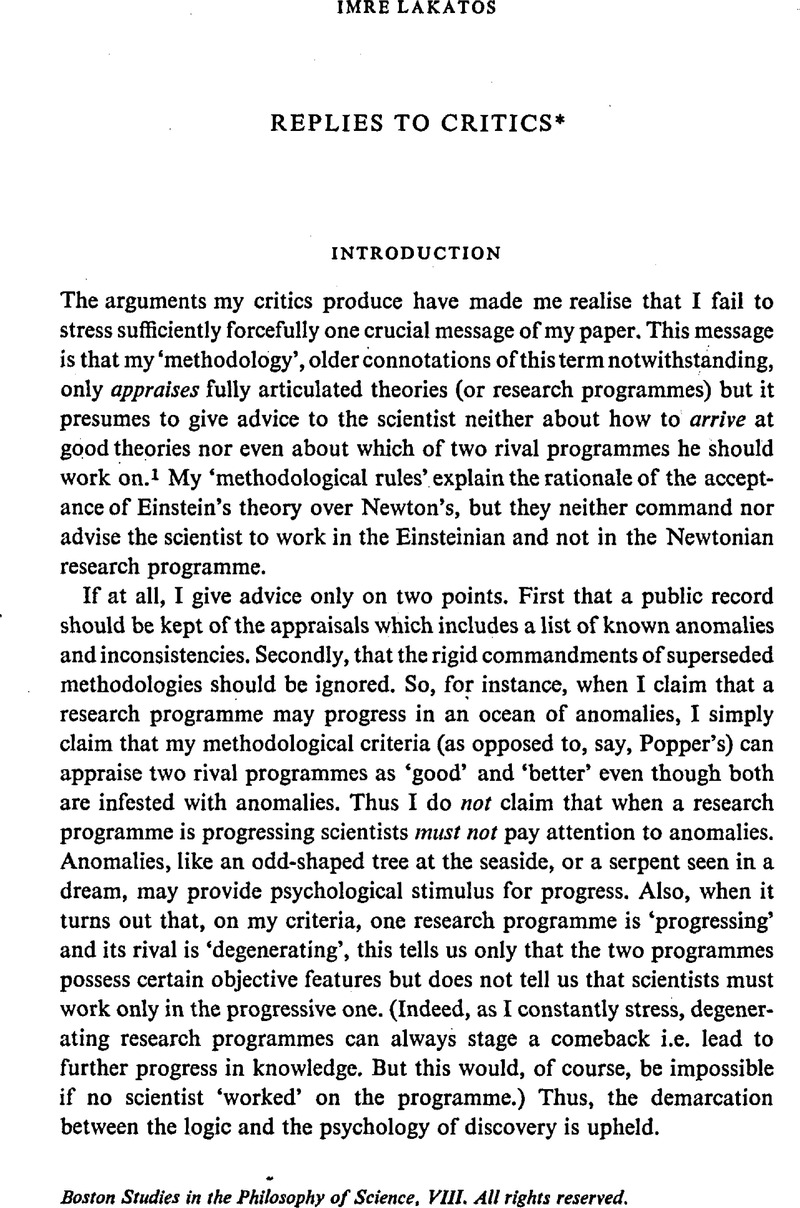
These replies, unfortunately, could not discuss my commentators’ essays in proper detail: both space and time were severely limited. I have tried to concentrate on the essentials. Moreover, because of the vagaries of the British Postal Service, I received Professor Kuhn's and Professor Feigl's most interesting comments so late that I was unable to prepare my replies in time for printing in this volume. I hope to have them published shortly.
In my Replies I refer time and again to my paper ‘Falsification and the Methodology of Scientific Research Programmes’ in Lakatos and Musgrave (eds.), Criticism and the Growth of Knowledge. For brevity I shall refer to it as ‘Lakatos (1970)’.
1 Cp. especially above p. 92 and note 2 on p. 123. For instance, Tarski's ‘methodology’ appraises mathematical proofs for validity but offers no heuristic for how to arrive at valid proofs. On this point also cp. my ‘Popper on Demarcation and Induction’, footnote 5.
2 Cp. Nature 188, (1960) 458.
3 For my ‘instrumentalism’ cp. especially Lakatos (1970), pp. 184-9.1 am afraid these pages were missed by many readers. Perhaps I should not have put them, as I did, into an Appendix.
4 In these matters I follow Bolzano, Frege and Popper. I gave the relevant references to Popper's important recent papers in footnote 1 of p. 180 of Lakatos (1970). My readers will be bound to misunderstand my paper (and, for instance, confuse my research programmes with Kuhn's paradigms) without having studied them.
5 Kuhn, ‘Reflections on my Critics’, in Lakatos and Musgrave (eds.), Criticism and the Growth of Knowledge, p. 239.
6 Feyerabend, ‘Consolations for the Specialist’, op. cit., p. 229.
7 Cp. Lakatos (1970), p. 130, footnote 5.
8 Whewell, of course, would have shrunk back from the idea that an inconsistent programme might be in any sense ‘coherent’, let alone lead us towards Truth.
9 A ‘creative shift’ is an empirically progressive development of a programme which was not anticipated at the outset. But I define ‘ad hoc3’ in exactly the same way. (Cp. above, p. 103 and note 36, and Lakatos (1970), p. 137 and p. 175, footnotes 2 and 3.)
10 Cp. the references above, note 1.
11 Kuhn, Structure of Scientific Revolutions, 1962, p. 82, my italics.
12 Kuhn, ‘The Essential Tension: Tradition and Innovation in Scientific Research’, in Taylor and Barron (eds.), Scientific Creativity, its Recognition and Development, 1963, p. 341.
13 Cp. above, p. 160.
14 Popper, The Poverty of Historicism, 1957, p. X.
15 Cp. above, p. 151. He repeats this statement on p. 158.
16 Cp. above, p. 122.
17 Cp. above, pp. 116-20.
18 Cp. above, pp. 116-22.
19 He quotes these two sentences out of context, above, p. 156. The qualifying normative term ‘great’ in the first sentence and the cautious word ‘may’ in the second sentence escaped his attention. Of course, the relevance of these qualifying terms only transpires from the context and the long adjoining exposition, which, however, he curiously regards as aberration from, instead of interpretation of, these sentences.
20 Cp. above, p. 151.
21 Cp. above, pp. 92 and note 2 on p. 123.
22 Cp. above, p. 152.
23 Cp. p. 128, note 70.
24 Cp. above, p. 153.
25 Cp. above, p. 92.
28 Cp. my monograph on Carnap's inductive logic in Lakatos (ed.), The Problem of Inductive Logic, pp. 315-417. Professor Hall, incidentally, does not notice - in spite of my explicit definitions of my technical terms - that my ‘inductive principles’ are not part of ‘inductivism’.
27 Cp. above, p. 128, note 70.